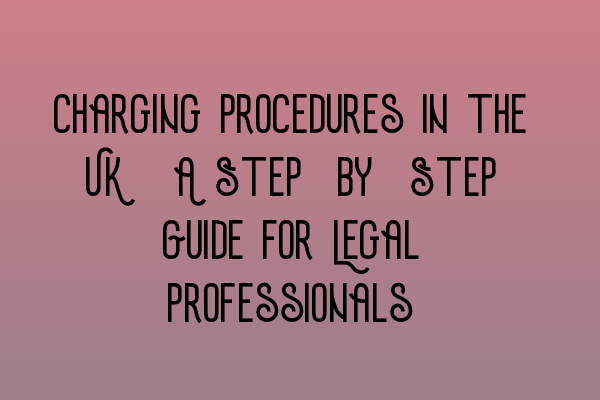Charging Procedures in the UK: A Step-by-Step Guide for Legal Professionals
Welcome to SQE Criminal Law & Practice Law UK, where we provide comprehensive guidance and resources for legal professionals. In this blog post, we will walk you through the charging procedures in the UK, offering a detailed step-by-step guide to help you navigate the criminal justice system with confidence. Whether you are a solicitor, barrister, or law student, understanding the charging procedures is essential for a successful criminal law practice.
The Charging Process: An Overview
Before we delve into the step-by-step guide, let’s first explore the basics of the charging process in the UK. When an individual is suspected of committing a criminal offense, the police will investigate the case and gather evidence. Once they have sufficient evidence, they may decide to proceed with charging the suspect. This marks the beginning of the formal criminal proceedings.
It’s important to note that the decision to charge someone is not taken lightly. The police and Crown Prosecution Service (CPS) must consider the strength of the evidence, public interest, and the likelihood of securing a conviction. Charging someone with a criminal offense has serious implications for the accused, which is why the process must be carefully followed.
Step 1: Arrest
The charging process typically begins with the arrest of the suspect. The police have the power to arrest an individual if they have reasonable grounds to believe that person has committed a criminal offense. During the arrest, the police will inform the suspect of their rights and the reason for their arrest, in accordance with the Police and Criminal Evidence Act 1984.
Once the suspect is arrested, they will be taken to a police station for further questioning and processing. It is at this stage that the police will begin gathering evidence and building their case against the suspect. This may involve conducting interviews, taking statements from witnesses, and collecting any physical or digital evidence.
Step 2: Pre-Charge Bail or Release
After the arrest, the police have a choice to either release the suspect with no further action, release them on pre-charge bail, or detain them for further questioning. The decision depends on various factors, such as the seriousness of the offense, the risk of reoffending, and the likelihood of the suspect attending court if released.
If the police release the suspect on pre-charge bail, they will be required to return to the police station at a later date for further questioning or to learn whether they will be charged. Pre-charge bail may also come with conditions, such as reporting regularly to the police or not contacting certain individuals involved in the case.
Step 3: Charging Decision
Once the police have completed their investigation, they will submit their findings and evidence to the CPS. The CPS will then review the case and make a charging decision. They have three options:
- No Further Action (NFA): If the CPS determines that there is insufficient evidence or it is not in the public interest to proceed with the case, they will take no further action. The suspect will be informed that they will not be charged.
- Caution or Conditional Caution: In some cases, the CPS may decide to offer the suspect a caution or conditional caution. This is an alternative to prosecution and is often used for less serious offenses.
- Charge: If the CPS believes there is sufficient evidence and it is in the public interest to proceed, they will formally charge the suspect with the criminal offense. The suspect will then receive a summons or a charge sheet, depending on the nature of the offense.
It’s worth mentioning that the CPS charging decision is taken independently and is based solely on the facts and evidence presented. It is not influenced by personal or political considerations.
Step 4: Court Appearance
Once a suspect has been charged, they will be required to appear in court to face the charges against them. The type of court will depend on the seriousness of the offense. Minor offenses are typically dealt with in the Magistrates’ Court, while more serious offenses will be heard in the Crown Court.
During the court proceedings, both the prosecution and defense will present their cases, calling witnesses and presenting evidence. The judge or jury will then consider the evidence and make a decision on the guilt or innocence of the accused.
Conclusion
In conclusion, understanding the charging procedures in the UK is crucial for legal professionals involved in criminal law practice. By following the step-by-step guide we have provided, you can confidently navigate the intricacies of the criminal justice system. Remember, the charging process begins with the arrest, followed by a decision on pre-charge bail or release. The police then submit their findings to the CPS, who make the final charging decision. The suspect will then appear in court to face the charges against them.
For more information and resources on criminal law and practice, we invite you to explore the following related articles:
